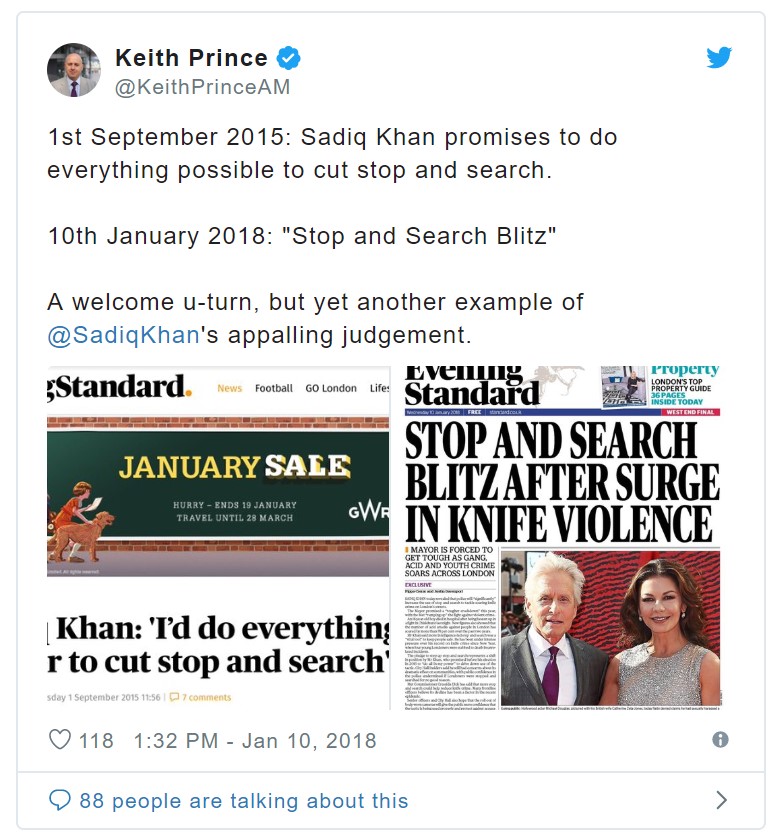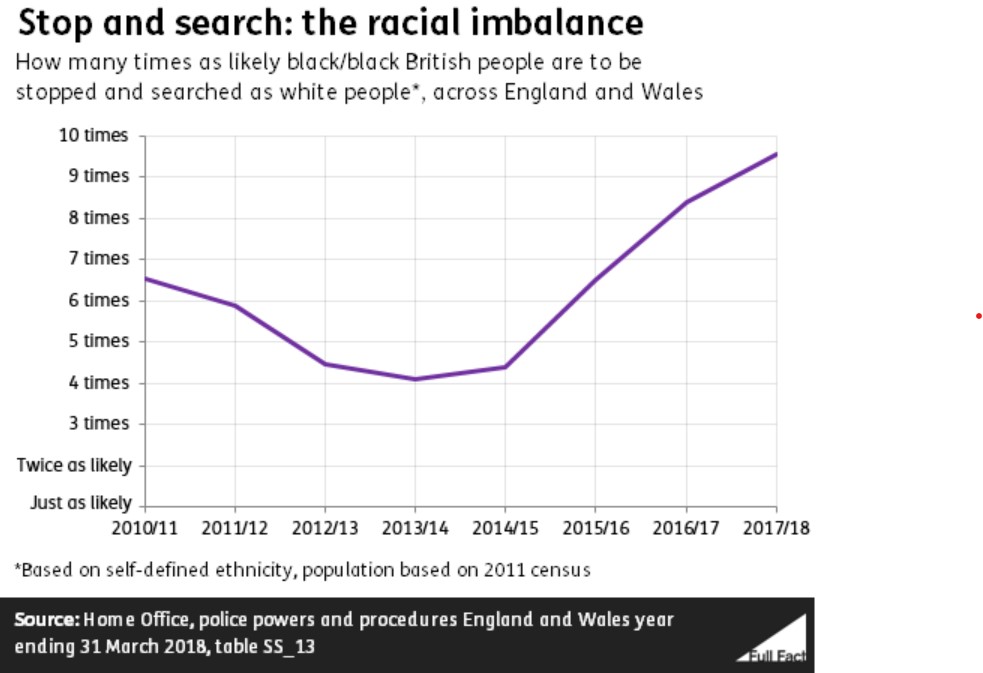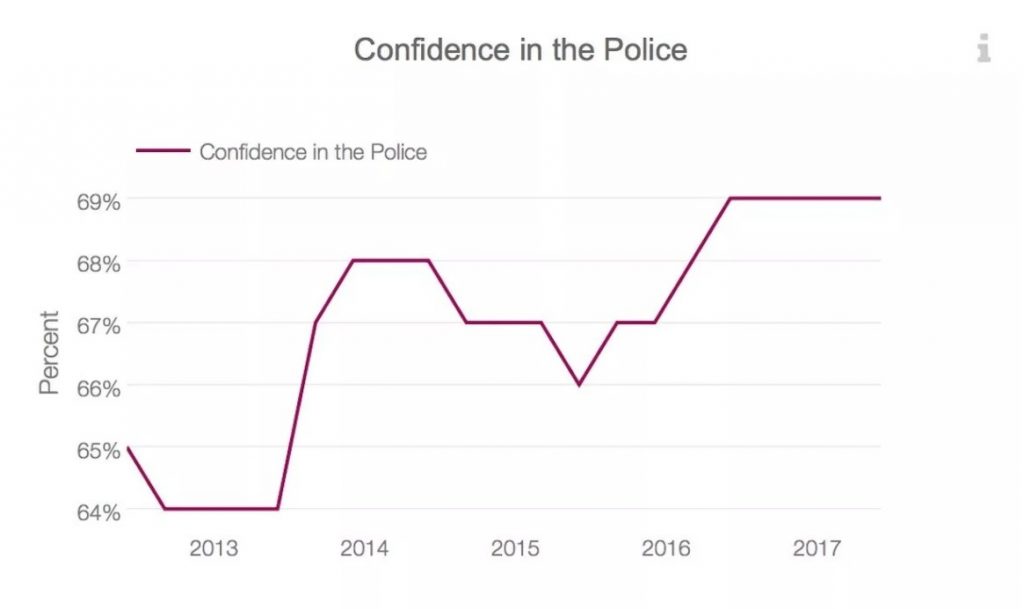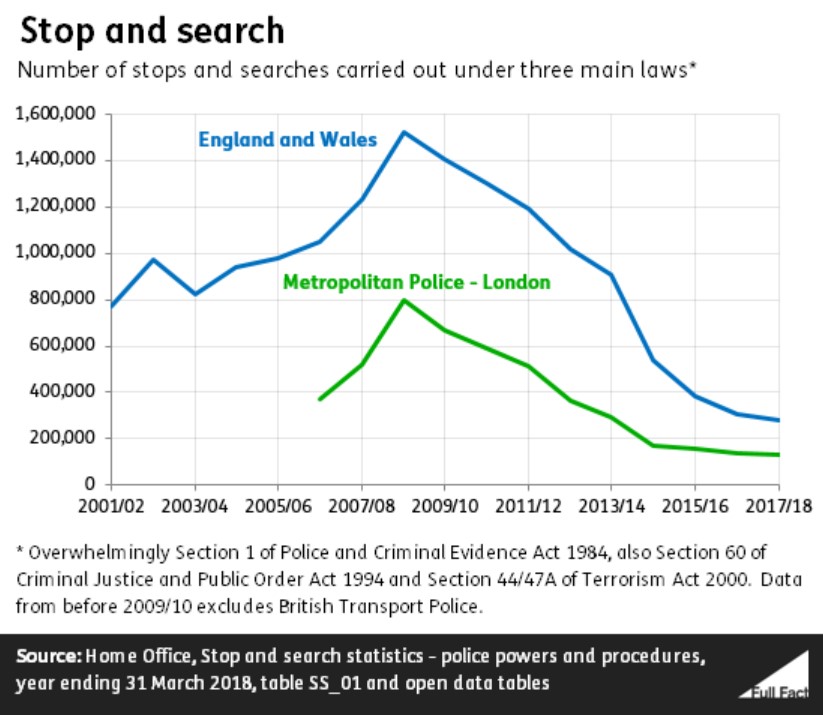Knife crime up 52%, burglary 17%, robbery 59%; London homicides higher than New York for February and March – Labour and Conservatives are quick to point fingers to attribute fault. Perhaps it is neither.
A crime wave across London has brought the new Tory cabinet under fire for cuts to vital services as £1 billion was axed from the police budget until Boris Johnson’s new pledge. Officers were cut below 30,000 for the first time since 2003. Others have criticised Sadiq Khan’s commitment to remove stop and search in 2015 and failure to deliver. Gareth Bacon, leader of the Tories in the London Assembly, accused the Mayor of “complacency, incompetence and shirking responsibility” in the wake of the city’s crime wave.

With knife violence again dominating London news headlines, political opponents of Sadiq Khan have sought to make hay at the mayor’s expense.
The truth is generally more nuanced and complex. A multitude of factors come together from austerity compounding in weaker police forces and response times, risk aversion of officers acutely aware of retaining community trust and avoiding harassment claims, less reliance on evidence-based data, lack of effective early prevention measures and a lack of leadership and responsibility from figureheads like the mayor, chief police commissioner and home secretary.
Tackling the crime wave sweeping London’s streets lies in wider responsibility and less finger pointing. Solving the knotty social problems that result in the drug trade, inner-city hopelessness, poverty, poor education and lack of opportunities that underpin crime in certain areas and populations all prove to be very expensive, intractable matters. Good answers have eluded us for decades.
What is “Stop-And-Search?”
It’s used by police to search people for things like drugs, weapons and stolen property, provided the officer has a reasonable cause to suspect they will find something.
With 17% of searches resulting in arrests last year under Section 1 of the Police and Criminal Evidence Act 1984 branch of laws. It is lawful providing the officer has a reasonable cause to suspect they will find something.
It may be tempting to take the higher arrest rate as an indicator of success. Her Majesty’s Inspectorate of Constabulary and Fire & Rescue Services note that an arrest isn’t necessarily a success, nor is it a failure to uncover any wrongdoing necessarily a failure.

Offenders could, for instance, be arrested even if no stolen or prohibited goods are found, because they might react violently to officers or be wanted for another offence. On the flipside, failing to uncover wrongdoing could be regarded as a success if, without the stop and search powers in place, the person under suspicion would otherwise have been arrested unnecessarily.
Racial Profiling Accusations
Despite this, accusations of racial “profiling” plague the policy as black people remain much more likely to be held up than whites.
The majority of the population is white. Most stops involve white people. Per capita, black people are about ten times as likely to be stop and searched than white people. 3 per 1000 whites in 2017/18, compared to 29 in every 100,000 blacks.
Targeted populations are disproportionately involved in gangs, drug-dealing and carrying of weapons. On this note, it is effective. But, at the same time, it is discriminatory. A catch-22 of how to balance effectiveness with societal considerations.
Many innocent young men are being stopped and frisked, and perhaps rightly feel unduly harassed because of their ethnicity. This can undermine confidence and faith in the police’s impartiality and trustworthiness. Particularly among those persons most likely to benefit from the measures in the long run: minorities living in run down areas.

These communities alienate themselves from police officers. In order for law enforcement to be effective in these areas, they must have the backing of the residents. On the other hand, there is no question that stop and frisk policy is responsible for more drugs and weapons being removed from the streets that would have been if the stop and search tactic had not been deployed.
An Intractable Issue?
One thing you will notice is that just about every argument “for” having legal authority to conduct stop and search can create subsequent arguments against. But also every argument “against” it can create subsequent arguments further down the chain “for”.
FOR Increased Stop & Search
1/ It acts as a deterrent – some people (not all, but some) may be deterred from carrying illegal items (drugs, weapons, stolen property etc.) if they think that police might find them. Without that power to search they could stroll past an officer with stolen credit cards, a gun, £300 of whizz and a lockpick in their pockets and there is no way for that officer to find them.
2/ It greatly assists the enforcement of preventative legislation such as laws prohibiting weapons carrying, possessing stolen property etc.
3/ It helps reduce incidents of serious injury, burglary, car crime etc. through incentivising criminals to not carry weapons that are more damaging, whether to human health or property.
4/ It gives reassurance to the general public by actively enforcing these points.
5/ It can nip a criminal career in the bud and thus reduce the number of people that progress to more serious offending – catching someone with a knife and confiscating it and arresting them – later giving them a police caution or minor sentence – may have stopped them later on stabbing somebody and thus earning a significant stretch in jail – or even having that weapon turned on them. It may just be the wake-up call they need to get back on the straight and narrow.
6/ It has a disruptive effect on criminal enterprise – dealers and handlers find their customers getting searched and so more reluctant to use their services. They also find it much more difficult to move their commodity about as part of their ‘work’
7/ It allows a peek into the level of criminality in given areas that might otherwise remain invisible – how do you know how much weapons carrying there is in a particular part of town or a county if you have no way of seeing it. The offenders are unlikely to willingly fill in questionnaires.

Against Increased Stop & Search:
1/ It can be seen as divisive against certain ethnicities or groups, or even in certain areas – whether that view is justified is immaterial, that can be the perception.
2/ It can leave a negative impression of police with those that were searched and found to be carrying nothing (I suppose those found carrying this stuff have a pretty negative impression as well, but they don’t count as much)
3/ It can expose a problem that politically, some would rather stay hidden – politicians trying to reduce budgets for policing, or regeneration and other social projects don’t want to have to justify that in the face of stark figures for drugs or weapons.
4/ It can be manpower intensive – as no matter how good the information is, or the experience of the officer – the fact remains that most stop-searches will not turn anything illegal up. Positive result finds in the UK range between 10–20% mark of all stops.
5/ It creates the opportunity for conflict, aggression and violence – this is one of those areas of policing that an officer and a criminal can coincide unexpectedly by either party. This creates a high “unknown” element to it. Whereas an officer called to a domestic disturbance has had time to get some background, formulate a plan, arrange backup. In a cold stop they may have just walked round the corner and come across someone who desperately needs searching.
By the same logic, a criminal that is involved in something (and domestic abusers are criminals) know that police may turn up to ruin the party and so usually has some basic plan in mind that tends to involve surrender, running off or lying profusely. But the point is they have mentally prepared for it and so there is less left to chance.
Now, some of these arguments against are not so much saying that there should be no stop and search, they are more arguing against how it is implemented.
In the UK, we have several search powers available for officers (PACE, Anti-terrorism, badgers act, countryside and wildlife act).
Dip samples of ‘civilian review panels’ find many officers ‘over-justify’ the reasons for searching.
They are risk-averse.
The bottom line is that nobody enjoys being searched (unless they are paying good money for it) but it is a necessary evil until someone comes up with a better method, so the better the experience is for them (treated humanely and respectfully) the less there is to turn them against the procedure.
Misrepresentation of statistics
Now in areas with a high visible ethnic minority (VEM) the use of section 1 stops is a cause for distrust on both sides. Often the street population of an area will have a high proportion of VEM than the residential population. In places like Brixton, or Toxteth the areas attract an influx of VEMs who are not resident in the area because of cultural attractions. This leads to statistics being misinterpreted when the number of stop checks are compared to the resident population.
Without doubt stop and search prevents crime especially when targeted to particular local need. The downside is that overuse of it drives a wedge between the police and the local community. I feel that both the police and the local community leaders have to work together to overcome the distrust rather than exacerbate the distrust.
When based on real intelligence, geographically focused and performed professionally, it is a vital tool for the police to keep our communities safe. It will allow the police to target and arrest offenders, take the weapons they carry off our streets and prevent attacks.
Although, stop and search is more of a reactive approach. Rather, shouldn’t the government be proactive in targeting deprived areas, lack of opportunity, gangs, drug-dealing, poor educational attainment and alternatives than feed the cycle of inner city hopelessness and poverty?


